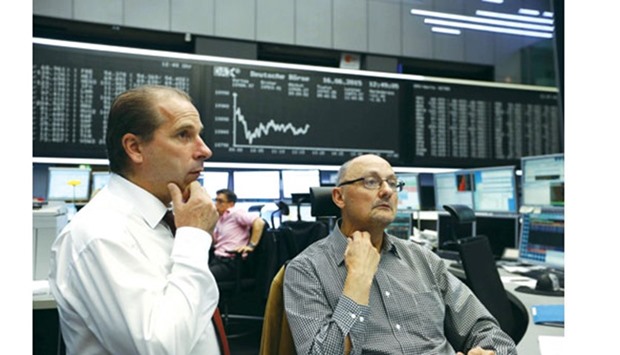Sterling suffered a dizzying “flash crash” yesterday, sending Brexit shockwaves across markets, while weak US jobs data calmed talk of an imminent Fed rate rise.
The pound plunged more than 6% against the dollar within minutes in Asian trading hours at the end of a tumultuous week of heavy losses over concerns about the terms of Britain’s EU exit.
The London stock market advanced yesterday as the weak pound boosted exporters.
Frankfurt and Paris however both ended the week in the red, while US stocks also sank as September jobs figures came in weaker than expected after strong job creation over the summer.
In London, the FTSE 100 up 0.6% at 7,044.39 points; Frankfurt — DAX 30 down 0.7% at 10,490.86 points and Paris — CAC 40 down 0.7% at 4,449.91 points at the close yesterday.
Analysts said it was unclear if the sudden plunge was down to a computer generated sell-off or other reasons but saw Brexit at the root of it.
UK finance minister Philip Hammond yesterday downplayed the flash crash, calling it “technical”.
But analyst Jasper Lawler, of CMC Markets, said that ultimately it was down to “a lack of buyers”.
“The United Kingdom’s historical record of relative stability has been thrown into doubt by Brexit and the populist political rumblings of (Prime Minister) Teresa May’s new government,” he said in a note to investors.
A Bank of England spokesman told AFP that it was “looking into” the cause of the flash crash — a vertiginous drop in an asset’s value that can be triggered and exacerbated by automated trading systems.
BoE head Mark Carney has also asked the Bank for International Settlements, known as the central bank of central banks, to look into the sharp drop, the BoE said.
Analyst Alex Edwards, of trading firm UKForex, said it was unclear if algorithm scanning, a big seller of the pound or a so-called fat fingered Tokyo trader was the cause.
“Whatever it was, it shows us that the pound is looking very vulnerable right now.”
French President Francois Hollande said Thursday that the EU should take a tough line with London during exit talks to prevent the break-up of the bloc.
His comments followed announcements by the British prime minister last weekend, signalling she would trigger Britain’s departure from the EU by the end of March.
HSBC Bank’s David Bloom said the pound had become a “political and structural currency”, having once traded on cyclical events and data.
“The currency is now the de facto official opposition to the government’s policies,” he said in a note to investors.
And Berenberg bank analysts said the risks for the pound were “heavily tilted to the downside” and its path would be determined by “the noise about and the substance of” the Brexit negotiations.
The crash was the second-largest intra-day decline in the pound, beaten only by its precipitous 11% slump on June 24, when the shock Brexit result emerged.
After rebounding, the pound again fell sharply this week on fears of a so-called “hard Brexit” that would see Britain depart the single market, or tariff-free zone, and end free movement of people into the country.

Traders work at the Frankfurt Stock Exchange. The DAX 30 closed down 0.7% to 10,490.86 points yesterday.
